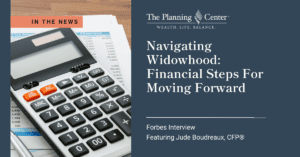This is a guest blog post originally printed at www.suddenmoney.com and reprinted with permission granted by the Financial Transitionist Institute.

It’s entirely possible that you will live 15 years longer than you thought you would when you were in college. If you are going to live for 15 more years, what are you going to do with those years?
That’s one of the questions we ask in Long-Life Planning.
It’s time to reframe aging.
It’s time to eliminate the word “old” from your vocabulary if you’re using it to describe the deterioration of your body and mind over time.
And it’s time to embrace the reality that preparing for your next great chapter isn’t a dream or a luxury—it’s a necessity. What’s more, after that great chapter, there can be another one. And another. Aging can be a fluid series of personal reinventions.
Why?
Because it’s almost 2017 and due to public-health campaigns and advances in medicine and technology that lead to diagnosing diseases earlier and treating them more effectively, more of us are living into our nineties than ever before. And there’s never been a better time for that to happen.
What we know about the human brain and body is vastly different from what most of us were taught decades ago. We now know that our intelligence isn’t fixed and that we aren’t doomed to necessarily mentally deteriorate exponentially with time. We know that there are patterns and similarities among people who live into their nineties and beyond. We know that exercise, optimism, meditation, community, diet, mindset, restful sleep, retiring after 65, and volunteering have all been shown to affect longevity.
Last year, these realities helped shape a new focus at the Financial Transitionist® Institute (a division of the Sudden Money® Institute) dedicated to what we call Long-Life Planning.
Part of what we do as Financial Transitionists® is help our clients prepare for major life transitions. Some of those transitions—retirement for instance—are eagerly anticipated and involve enthusiastic discussions about beach houses and bucket-list activities. In contrast, however, the topic of aging has typically come with a fair amount of discomfort, if not dread. Denial often fills the air.
Fortunately, we have developed a process and a structure for productive and meaningful conversations about your aging and the aging of your significant family members. And we see these important discussions as setting the stage for however many personal reinventions you envision. Engagement in life during all of its ages and stages is something we should all be passionate about, and helping you find that passion for engagement is our mission.
Where do we begin?
 People are living longer—and certainly longer than was part of the equation when most retirement charts were made. But as a culture, we’re not yet at the point that we talk about this reality as something positive to look forward to. And we need to. If living into our nineties is part of our reality, we need to treat it that way by talking about it—by normalizing it. If aging is no longer viewed as a disease to be treated or managed, then there’s no reason it should be talked about in whispers, or worse, not talked about at all for fear of what it might bring.
People are living longer—and certainly longer than was part of the equation when most retirement charts were made. But as a culture, we’re not yet at the point that we talk about this reality as something positive to look forward to. And we need to. If living into our nineties is part of our reality, we need to treat it that way by talking about it—by normalizing it. If aging is no longer viewed as a disease to be treated or managed, then there’s no reason it should be talked about in whispers, or worse, not talked about at all for fear of what it might bring.
In financial planning, we talk about retirement as having an early, mid and later stage. Aging happens in stages too, so it’s time we talk about what to expect, how to prepare, and what our aspirations are. Long Life Planning honors the dynamics of aging and plans for its stages. It keeps expansive conversations about possibilities and opportunities alive and plans for them rather than seeing them as fading dreams. Long Life Planning discussions transform what was thought to be unattainable or unachievable into vibrant discussions about preparation for the future. It normalizes aging and shifts the conversation to the exciting and inspiring aspects. It dares to ask: If you are going to live 15 years longer, what would you make happen, where would you go, and who would you spend time with?
And the conversation is by no means one-and-done. An annual review of where you are and where you want to go is integral to normalizing long life. So meet with your advisors and do some big, broad thinking for the year. Set the stage for what’s coming and what you’re moving toward in your life. Check in on your health, wealth, and possibilities. Review your health insurance coverage and take a good look at your housing and consider whether it’s optimal for you for the coming year, or maybe for longer. And if it isn’t, research your options. Financially test your options—not just for housing, but also for other aspects of your life and goals that shift as you age. You are in charge of your own reinventions.
Finally, remember that your language reveals your mindset.
Language is powerful; it tells the world where you stand and how you feel. Listen to yourself when you talk about aging. Pay attention to the messages you are sending. Do you refer to aging in terms of limits and restrictions? Is your vision of your life very narrow when you think about the future? Make a concerted effort to frame your own aging by referring to it in the most positive terms.
Your mindset is revealed not only in your language to the world, but also in the way your body reacts internally to the idea of aging. Quite simply, people with more positive mindsets use more positive language and feel better about their aging.
So, how do you feel about aging, and what are you going to do with your 15 years?
Prepared by Yeldarb. Copyright 2017.





